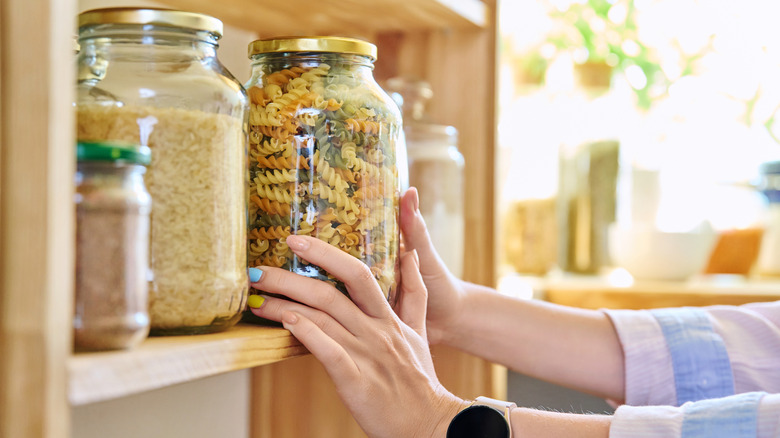How The FIFO Pantry Storage Method Saves Money And Reduces Food Waste
If you're fed up with constantly throwing out expired food and wasting money, it might be time to rethink your storage method. One big mistake people make when restocking their pantry is simply loading it up without checking the shelf life of their items. Without a proper system, it's almost inevitable you'll end up with a bunch of spoiled and good-for-nothing items shoved in the back.
Thankfully, someone thought things through and came up with the FIFO principle. Standing for "first in, first out," this basic storage method ensures older items are always used before newer ones. Supermarkets use this all the time, which is important to note if you want to make sure you get the freshest perishables possible at the grocery store. It's also a great way to get your own storage habits back on track.
Implementing the FIFO principle will not only save you money, but help you cut back on food waste and live more sustainably. This is particularly important when you consider 1.05 billion tons of food were wasted in 2022, according to the United Nations. In other words, more than a third of all food produced on a global scale ends up in the trash. If you think organizing your pantry can't boost your budget and save the planet, let's break things down.
How does the FIFO pantry storage method work?
Following the FIFO principle is the best way to keep track of your chaotic kitchen pantry — and it doesn't cost a penny. Instead of putting all your goods into the pantry at once, pick out the products with the closest expiration dates and place them at the front. The longer-lasting items can go elsewhere until your current pantry supplies run out. Even if you don't use those items before they expire, you can always donate them to a shelter instead of finding them later and throwing them away.
By rotating your food and placing soon-to-expire items first, you'll have a better idea of what you have and what you're running low on. This makes it easier to figure out what you need to buy, prevents unnecessary spending, and saves you some cash in the long run.
This unique storage approach also helps you better understand your household needs, and saves valuable time by making it easier to find what you need. Why not give it a try the next time you come back from the grocery store?

